
Latest News Regarding
Horn of Africa
Ethiopia Back on the Brink
Ethiopia Back on the Brink
Source: Foreign Affairs posted on 8 April 2024 a commentary titled “Ethiopia Back on the Brink” by Alex de Waal and Mulugeta Gebrehiwot Berhe, both with the World Peace Foundation at Tufts University.
The authors point out that the war in Tigray Region has been followed by rebellion in Amhara Region and continuing unrest in Oromia. Famine threatens both Tigray and Amhara Regions. The United Arab Emirates is keeping the Abiy Ahmed government afloat but is also encouraging reckless projects
Ethiopia set to join EAC, CS Malonza says
Ethiopia set to join EAC, CS Malonza says

Source: KBC, Tuesday April 9, 2024
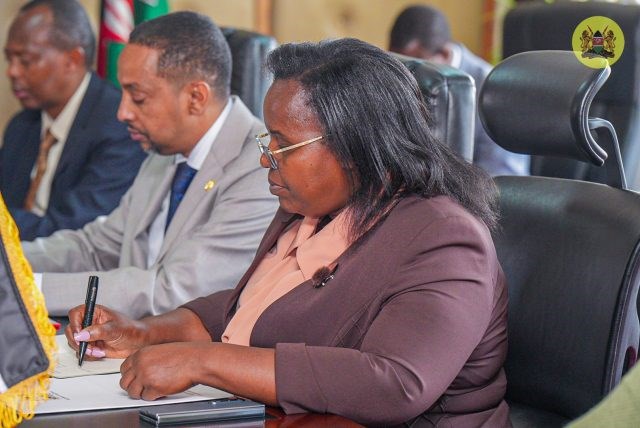
Cabinet Secretary for EAC, ASALs and Regional Development Peninah Malonza
Ethiopia is set to become the 9th member state of East Africa Community (EAC), just a few months after Somali’s admission to the bloc.
This was disclosed by Peninah Malonza, the Cabinet Secretary for Ministry of EAC, Arid and Semi-arid Lands and Regional Development.
Speaking while leading a relief food distribution drive in Kitui Central Constituency, Malonza announced that talks between Ethiopia and EAC Summit Heads of states are in the last stages and soon Ethiopia will be part of the bloc.
Aside from Ethiopia’s admission, the EAC partner states also seeks to harmonize critical policies and put in place requisite institutions to attain a single currency for the region by the end of this year as outlined in the EAC Monetary Union Protocol.
East African Community (EAC) is a regional intergovernmental organisation of eight (8) Partner States, comprising the Republic of Burundi, the Democratic Republic of Congo, the Republic of Kenya, the Republic of Rwanda, the Federal Republic of Somalia, the Republic of South Sudan, the Republic of Uganda and the United Republic of Tanzania, with its headquarters in Arusha, Tanzania.
US warns of possible attacks on ‘multiple locations’ in Mogadishu
US warns of possible attacks on ‘multiple locations’ in Mogadishu

By Harun Maruf
Source: VOA, Tuesday April 9, 2024
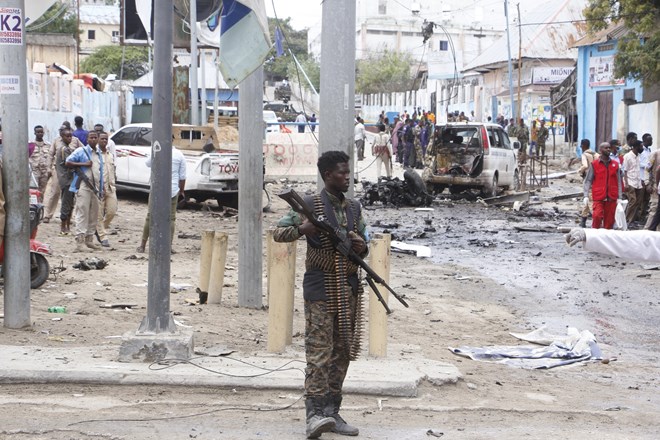
A Somali soldier secures the area after a car bomb attack at a Presidential Palace checkpoint in Mogadishu, Somalia, Sept. 25, 2021. (AP File Photo)
The U.S. Embassy in Nairobi says it has received information about threats to multiple locations in the Somali capital, Mogadishu.
One of the locations identified as a possible target for the threat is the city’s main airport, the Aden Adde International Airport, which also serves as a base for the African Union mission in Somalia and multiple embassies, including the United States and other Western countries.
“All movements of U.S. Embassy personnel have been canceled for Tuesday, April 9, 2024,” the security alert said. The alert added, “The U.S. Department of State level-four travel advisory (“do not travel”) for Somalia remains in effect due to crime, terrorism, civil unrest, health issues, kidnapping, and piracy.”
U.S. citizens have been urged to take several measures including reviewing their personal security plans and avoiding large crowds, gatherings and demonstrations, among other steps, to ensure their safety.
The United States did not specify where the threat is coming from, but the al-Shabab militant group has been carrying out attacks against the Somali government, African Union forces and other nations supporting Somalia.
Meru farmers halt Somalia miraa export over tax hike
Meru farmers halt Somalia miraa export over tax hike

Source: Hiiraan: Monday April 8, 2024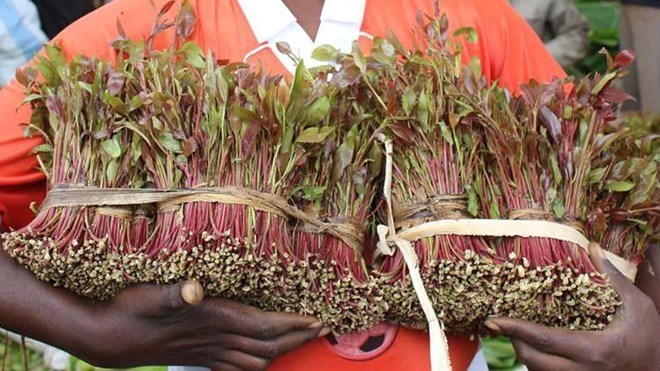
Nairobi (HOL) – Miraa (khat) farmers in Meru, Kenya, have declared a week-long halt to their exports to Somalia, citing concerns over high tax rates. The suspension is a reaction to the financial strain they face due to the 80,000 Kenyan shilling (627.25$) levy imposed per shipment at airports.
The steep tax, introduced in 2022, has significantly reduced the farmers’ earnings. During a gathering at Maili Tatu Stadium, they expressed their grievances and warned that the suspension could extend if the Kenyan government fails to address their issues promptly.
The tax dispute comes after Somalia, in July 2022, consented to renew khat trade with Kenya, a move facilitated by discussions between Somali President Hassan Sheikh and former Kenyan President Uhuru Kenyatta.
Ethiopia, Turkey, Somalia, and Somaliland: It’s Complicated
Ethiopia, Turkey, Somalia, and Somaliland: It’s Complicated
Source. The Conversation published on 3 April 2024 a commentary titled “Turkey and Ethiopia Have Had Close Ties for Many Years: Somalia Maritime Deals May Shift the Dynamics” by Michael B. Bishku, Augusta University.
Long standing Ethiopia-Turkey ties are being put to the test as a result of Ethiopia’s deal with Somaliland for a military base and reportedly diplomatic recognition. Turkey has a military base in Somalia, which opposes the Ethiopia-Somaliland deal, and is training Somali soldiers and equipping its naval force. This situation poses a dilemma for Turkey’s relations with Ethiopia.
First UN food aid in months arrives in Sudan’s Darfur as famine looms
Source: UN, First UN food aid in months arrives in Sudan’s Darfur as famine looms
Aid deliveries follow talks to reopen humanitarian corridors from Chad amid warnings that millions face acute hunger.
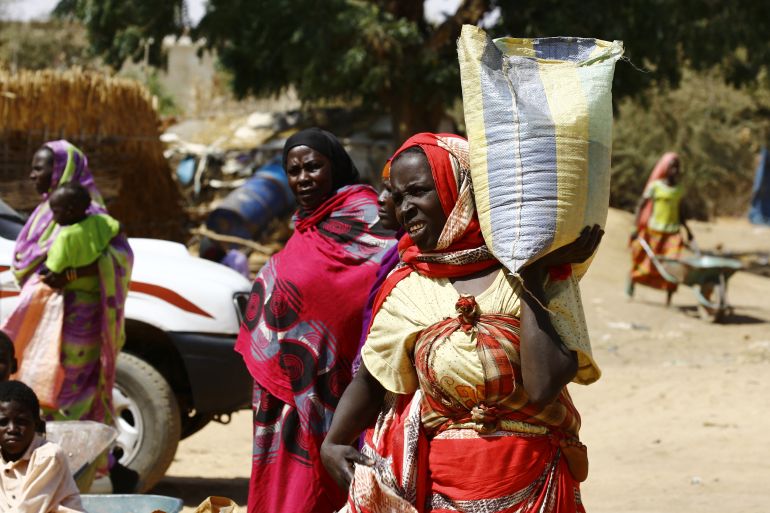
Published On 5 Apr 20245 Apr 2024
The United Nations has begun distributing food in Sudan’s war-ravaged Darfur region for the first time in months amid warnings of impending famine caused by a yearlong war and lack of access to food aid.
The UN’s World Food Programme (WFP) said two aid convoys crossed the border from Chad in late March, carrying food and nutrition assistance for about 250,000 people for a month.
Puntland leader accused of blocking several development projects in Puntland
Puntland leader accused of blocking several development projects in Puntland

Source: Hiiraan Online, Saturday April 6, 2024
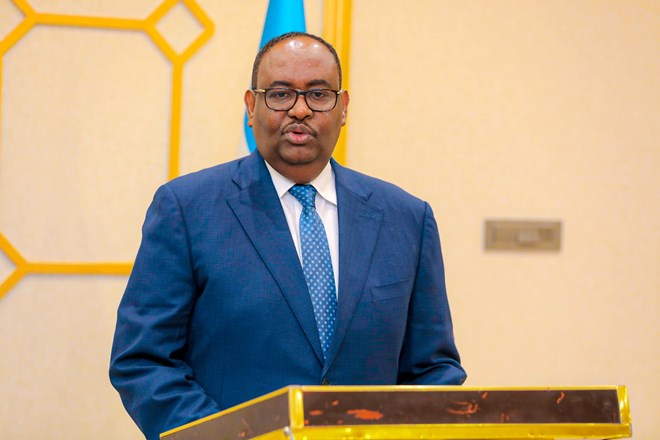
Mogadishu (HOL) – Somalia’s Deputy Minister of Finance, Abdiqafar Hassan Hange, has accused the leader of Puntland, Said Deni, of blocking many projects that would have created jobs and other opportunities for the Puntland people.
Speaking in Mogadishu on Friday, Minister Hange emphasized that dozens of projects costing hundreds of millions of dollars are on the table, awaiting Puntland’s signature.
The pending projects include the national teachers’ salary project, the Damal Health project, the Barwaaqo project (formerly Biyole), the budget subsidy project, and the Energy and Electricity project, according to the minister.
“Deni wants to starve the people of Puntland and make them unemployed, and they are not allowed to think, which are the hallmarks of a dictator,” said Abdiqafar Haange.
He also stated that Puntland leader Said Deni is conflating his political conflict with the federal government and development projects for his state.
In May 2023, Deputy Finance Minister Abdiqafar Hassan Hange stated that Deni’s opposition to the federal government stemmed from his unsuccessful bid to become Prime Minister.
Last year, 2022, Deni publicly supported Mohamud during the climactic final round of the national presidential elections, resulting in Mohamud defeating the incumbent President, Mohamed Abdullahi Farmaajo. At that time, political analysts widely anticipated Mohamud would select Deni or one of his close associates for the Prime Minister’s position, but this expectation did not materialize.
However, last week, the oil-rich, semiautonomous region of Puntland said it would operate as a state that’s independent of Somalia until changes to the adopted Somali constitution are approved via a popular referendum.
Puntland is a territory of about 4.9 million people in northeastern Somalia. In January, regional lawmakers reelected Said Abdullahi Deni as the area’s leader for another five years.
Why are Somalia and Ethiopia in a deepening diplomatic dispute? | Inside Story
Why are Somalia and Ethiopia in a deepening diplomatic dispute? | Inside Story

Source: Aljazeera, Saturday April 6, 2024
Rift comes after Somaliland deal giving landlocked Ethiopia access to the Red Sea
A deal between Ethiopia and the breakaway region of Somaliland involving the lease of coastline and establishment of a naval base has further worsened diplomatic relations with Somalia.
Somalia’s government is furious at the agreement, which would give landlocked Ethiopia access to the Red Sea.
So far it is only a diplomatic dispute. But why is this rift worsening, and could there be wider consequences?
Russia Strengthens Eritrea Ties with High Level Naval Visits
Russia Strengthens Eritrea Ties with High Level Naval Visits
Source: The Eritrean Ministry of Information published on 4 April 2024 a press release titled “Russian Delegation Visits Northern and Southern Red Sea Regions.”
The deputy commander of the Russian navy led a delegation to Eritrea in early April when it toured a variety of port and airport facilities.
Military Africa published on 3 April 2024 an article titled “Russian Navy’s Udaloy Class Frigate Visits Eritrea to Strengthen Ties” by Kazim Abdul.
Coinciding with the Russian deputy naval commander’s visit, the Udaloy class frigate, Marshal Shaposhnikov, and guided missile cruiser, Varyag, made a five-day visit to Massawa marking the 30th anniversary of diplomatic relations between Eritrea and Russia.
Critical Threats published on 4 April 2024 an article titled “The Kremlin’s Red Sea Ambitions in Eritrea” by Liam Karr.
The article provides additional detail on the Russia-Eritrea relationship.
Atrocities in Ethiopia’s Amhara Region
Atrocities in Ethiopia’s Amhara Region
Source: Human Rights Watch published on 4 April 2024 a report titled “Ethiopia: Military Executes Dozens in Amhara Region.”
Human Rights Watch (HRW) reported that the Ethiopian military summarily executed scores of civilians in Merawi, a town in Amhara region, during fighting in January and February with Fano militia. HRW called for an independent inquiry by the UN High Commissioner for Human Rights.
Somalia expels Ethiopian ambassador, closes consulates amid port deal controversy
Somalia expels Ethiopian ambassador, closes consulates amid port deal controversy

Source: Hiiraan Online, Thursday April 4, 2024
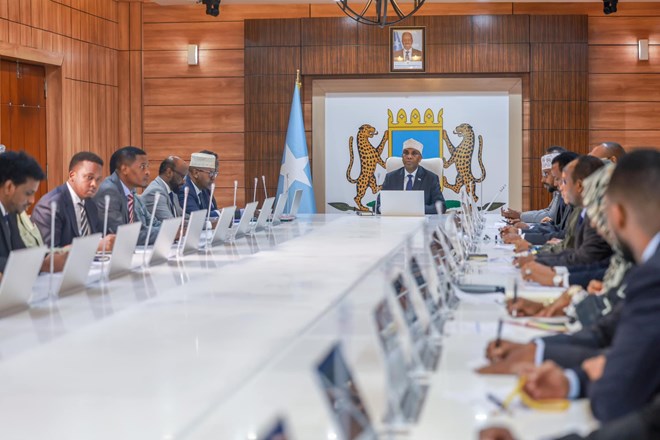
Mogadishu (HOL) – Somalia has expelled the Ethiopian ambassador and shuttered its consulates in the Puntland and Somaliland regions on Thursday, a day after Ethiopia’s State Minister for Foreign Affairs discussed a bilateral issue with a delegation from Puntland in Addis Ababa.
In a statement, the Council of Ministers accused the Ethiopian government of interfering in Somalia’s internal affairs.
Ethiopia’s State Minister for Foreign Affairs, Ambassador Mesganu Arga, met with a delegation from Puntland, led by its Finance Minister, Mohammed Farah Mohammed, in Addis Ababa on Wednesday. They discussed collaborative opportunities in trade, investment, energy cooperation, and joint infrastructure projects to bolster and broaden the two sides’ ties.
Last Saturday, Puntland announced that it withdrew its recognition of Somalia’s federal Government in Mogadishu after Somalia’s bicameral parliament ratified plans to amend Somalia’s constitution.
Officials from Somalia confirmed these actions directly responded to Ethiopia’s involvement in a lease agreement for coastal land in the disputed Somaliland territory.
Ethiopia’s foreign ministry spokesperson Nebiyu Tedla said it did not have information on the matter.
Ethiopia signed a memorandum of understanding on January 1 to lease a 20-kilometer stretch of Somaliland’s coastline. However, Somalia, which claims sovereignty over the region, has faced stern opposition. The deal, which includes Ethiopia’s intention to establish a naval base and hints at recognizing Somaliland’s autonomy, has sparked fears of increased instability in the Horn of Africa.
Somali President Hassan Sheikh Mohamud has denounced the agreement as illegal, warning of defensive measures should Ethiopia proceed. The expulsion of the Ethiopian ambassador and the consulate closures signal a deepening rift, with potential implications for the 3,000 Ethiopian troops in Somalia under the African Union’s peacekeeping mission.
Read below the statement from the Somali cabinet of ministers.
- As of April 4, 2024, the Federal Government of Somalia has decided to close and revoke the operating permission of the Ethiopian Consulates in the cities of Garowe and Hargeisa. These two consulates must be closed within a week.
- Diplomats and employees of the Ethiopian government working in the aforementioned cities must depart the country within the stipulated week.
- Non-compliance with this resolution by Ethiopian Government diplomats will be deemed a violation government’s sovereignty of the Federal Republic of Somalia, and further measures will be taken against them in accordance with international diplomatic protocols.
- The Ministry of Foreign Affairs of Somalia is tasked with officially communicating this resolution to the Ethiopian government and notifying the Ethiopian government of the Federal Republic of Somalia to return to his country for a consultation.
- This resolution will be effective upon approval by the Cabinet of Ministers of the Federal Republic of Somalia and upon being signed by the Prime Minister of the Federal Government of Somalia.
Sudan: Warring Factions Target Civil Society
Sudan: Warring Factions Target Civil Society
Source: Aljazeera published on 1 April 2024 an article titled “Are Sudan’s Civil Society Activists Being Targeted by Both Warring Sides?” by Mat Nashed.
There are recent reports that both the paramilitary Rapid Support Forces (RSF) and Sudan Armed Forces (SAF) are targeting and sometimes arresting civil society activists who operate soup kitchens for the poor and provide other help in their “emergency response rooms.” The goal of the RSF and the SAF apparently is to maintain control over all elements of civil society.
Kenya-Somalia border posts to remain closed as Atmis drawdown winds down

Source: Nation, Kenya, Wednesday April 3, 2024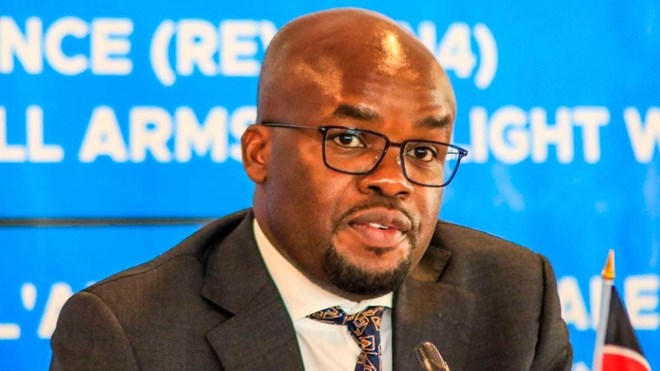
Kenya’s Interior Principal Secretary Raymond Omollo addresses journalists at Sarova Panafric Hotel in Nairobi, Kenya on March 4, 2024. PHOTO | BILLY OGADA | NMG
Kenya will not reopen its border posts with Somalia anytime soon because of the security implications of doing so at a time when the African Union peacekeeping mission in the neighbouring country is winding down.
Interior Principal Secretary Raymond Omollo told Nation.Africa in an interview that the move was informed by the need to secure the country at all entry and exit points.
Dr Omollo’s revelation comes nine months after his boss Interior Cabinet Secretary Kithure Kindiki, and his Somali counterpart Mohamed Ahmed Sheikh Ali announced their intention to reopen the borders following high-level consultations in Nairobi, which would have ended a 12-year barricade that began in 2011.
With Kenya sharing some 800 kilometres of border with Somalia, a distance almost equivalent to the journey from Mombasa to Busia, Omollo admitted that the route had proved very difficult to secure.
But with Somalia being the newest member of the East African Community (EAC), Dr Omollo said the troubled country was entitled to benefit from the seamless trade and movement enjoyed by other member states of the community.
“Somalia is unique because it has faced a lot of challenges especially terrorism. But when you look at the long border, it makes it very daunting. We had plans and we still have plans to open several border points with Somalia, we thought not now but we will do so even as we consider the challenge of insecurity that this move brings,” said Dr Omollo.
He also explained that Kenya expects more security challenges with the planned withdrawal of the African Union Transitional Mission in Somalia (Atmis) troops in Somalia.
“We are eagerly waiting to see how the drawdown will go and maybe after a few months to almost a year we will be able to make these border points (between Kenya and Somalia) fully functional,” he said.
In addition, the sheer terrain of the stretch shared by the two countries is very rough and will require very heavy investment to seal the loopholes in controlling movement in and out of Kenya.
“This area is largely arid, so yes, some may say we have a porous border, but it has to be seen in the context of the distance and the geographical features along the border points,” he said.
Although the land border posts have yet to open, there is still movement between Kenya and Somalia, particularly by air, with daily flights on the Nairobi-Mogadishu route.
This alone means a large number of business transactions between the two countries, which Dr Omollo says necessitates the reopening of the closed border points.
“We need to open the border points, which will go a long way in increasing the volume of trade. It will also help us deal with illicit trade as the reopening will help us address the issues that are pushing many to the porous points at the borders,” he said.
Dr Omollo also gave an insight into the National Border Management Conference at the Bomas of Kenya in Nairobi, which begins on Tuesday and will bring together stakeholders in border management to discuss strategies to improve efficiency in the sector.
At the summit, stakeholders will take stock of operations at border posts over the past decade since the establishment of the Border Control Coordination Operations Committee, currently chaired by Dr Omollo.
“We are meeting to review what is happening globally in terms of border control and also to emphasise the inter-agency approach and coordination in border management. We will also discuss the challenges we face in this area,” he said.
Currently, Kenya shares borders with five countries including Somalia, Ethiopia, South Sudan, Uganda and Tanzania, necessitating efficient operations at border points in terms of movement of people and goods to facilitate trade.
“As we speak today, one of the agencies, the Kenya Revenue Authority (KRA), will soon be deploying drones to support its operations at some of the land border points where they are the lead agency in terms of border operations at the land points,” PS Omollo said.
He also said Kenya was changing tactics and would use technology where it could not deploy border guards.
“In the case of the Kenya Ports Authority (KPA) or airports, we have body scanners and cameras and that speaks to the fact that it is impossible to have boots in every room. It is also not cost-effective, and we have to use technology to do that, whether it is drones, cameras or police equipment in terms of security,” he said.
In 2023, fake documents and identification accounted for 40 percent of all crimes recorded at Kenya’s border points, and the government hopes to curb this menace through the country’s new visa-free regime, which has significantly reduced such incidents.
“We have invested in making it difficult for people to obtain travel documents. The introduction of the visa-free regime has also helped to reduce this challenge. Even before someone comes to Kenya, we have information in advance, we can do pre-screening and share the data with agencies like Interpol,” he said.
Aside from the issue of document forgery at border points, there is also the challenge of illegal movement and trafficking, which deprives the country of much-needed revenue to run its programmes.
“For the past month or so, we have been discussing the issue of illicit alcohol and part of it is that we have ethanol crossing the border that is cheaper than what is available in Kenya. In the illicit trade, people are evading taxes and depriving the government of revenue,” said Omollo.
Also key to the government’s plans to improve border management is the involvement of communities through the Peace Committees, which are made up of national government administrators and village elders.
“This acts as a forum for the government to talk to the community and identify the challenges, the issues and their concerns, and this helps to address not only the security challenges associated with movement across the border and also the illicit trade,” Dr Omollo said.
The state is also engaging a number of partners, including IOM, and holding bilateral discussions with other development partners, including the UK and US governments, to support the implementation of community engagement programmes in the border counties.
Somalia receives $31M from IFAD to boost rural resilience and food security
Somalia receives $31M from IFAD to boost rural resilience and food security

Source: Hiiraan,Online, Wednesday April 3, 2024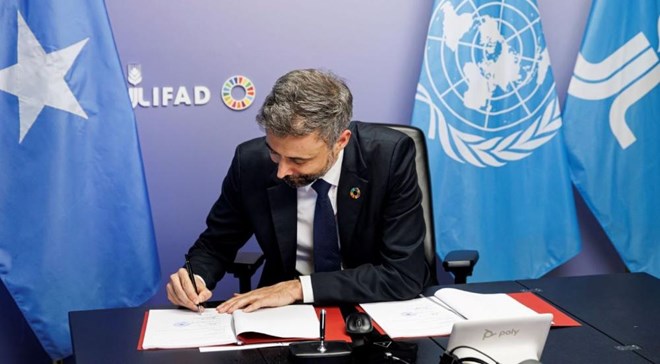
©IFAD/Flavio Ianniello
Source: Hiiraan Online, Mogadishu (HOL) – Somalia has inked a financial deal with the International Fund for Agricultural Development (IFAD), receiving $31.22 million for the Rural Livelihood Resilience Programme (RLRP), which aims to boost food security and resilience in rural areas. This program, the first direct investment by IFAD in Somalia since the clearance of the country’s arrears, focuses on increasing agricultural productivity and improving water resources management.
IFAD President Alvaro Lario emphasized the initiative’s importance, stating, “Upscaling our investment in Somalia is very important in this moment of increasing climate change to make sure that the poorest and the most vulnerable in rural areas are not left behind.”
The RLRP intends to assist 30,000 households over eight years, prioritizing women and youth. The program aims to enhance agricultural practices, market access, and financial support across the value chains. It will also strengthen community resilience by improving infrastructure and providing training.
Somalia’s debt forgiveness with IFAD, facilitated by contributions from Belgium, Germany, Italy, and Sweden, has paved the way for this investment. Somalia’s Minister of Finance, Bihi Egeh, acknowledged the international support, saying, “The programme is of vital importance for Somalia and sets to transform rural livelihoods through climate resilient agriculture.”
“We thank our creditors and development partners for clearing Somalia’s arrears and providing financial assistance to support country’s resilience and growth,” he added.
The announcement comes as Somalia’s Prime Minister Hamza Abdi Barre appointed Abdihakin Yusuf Ali Ainte as the Director of the Food Security and Climate Department. Ainte is a writer and researcher who is the Co-founder of iRise Hub, a technology-focused co-working space in Mogadishu.
The completion of Somalia for the Heavily Indebted Poor Countries (HIPC) initiative in December 2024 allowed it to progress toward economic recovery, enhancing its ability to secure investments for development.
Sudan’s Warring Factions Contribute Directly to Likely Famine
Sudan’s Warring Factions Contribute Directly to Likely Famine
Source: The Washington Post published on 1 April 2024 an article complete with photographs titled “Hunger Stalks War-ravaged Sudan as Aid Is Blocked and Looted” by Diana Zeynab Alhindawi and Katharine Houreld.
The paramilitary Rapid Support Forces routinely loots food warehouses in Darfur while the Sudan Armed Forces periodically blocks the delivery of food there. These factors contribute to Sudan being on the brink of famine.
How Gold Fuels the War in Sudan
Monday, April 1, 2024
How Gold Fuels the War in Sudan
Source: Chatham House posted on 15 March 2024 a 35-minute podcast titled “How Gold Fuels the War in Sudan” with Ahmed Soliman, Suliman Baldo, and Denise Sprimont-Vasquez.
Military business networks controlled by the Sudan Armed Forces (SAF) and the paramilitary Rapid Support Forces (RSF) are financing much of the cost of war in Sudan, which is the third largest gold producer in Africa after Ghana and South Africa. An estimated 50 to 80 percent of gold production is smuggled out of Sudan illegally. It is a critical source of income for both the RSF and SAF. Neither oil nor gum Arabic, once important foreign exchange earners for Sudan, are significant income sources today.
The RSF controls gold produced at a half dozen locations in Darfur. Most of the gold smuggled by the RSF through the Central African Republic, Chad, and Libya ends up in the UAE for refining. Some of it is smuggled out by Russia’s Wagner Group.
The SAF exports its gold through Port Sudan and most of it goes to Egypt. Before the conflict between the RSF and the SAF, Sudan’s gold tended to be handled by the Wagner Group.
Prime Minister Abiy Ahmed appoints Somali Politician as deputy Ethiopia Prime Minister
Prime Minister Abiy Ahmed appoints Somali Politician as deputy Ethiopia Prime Minister

Source: Hiiraan Online, Tuesday April 2, 2024
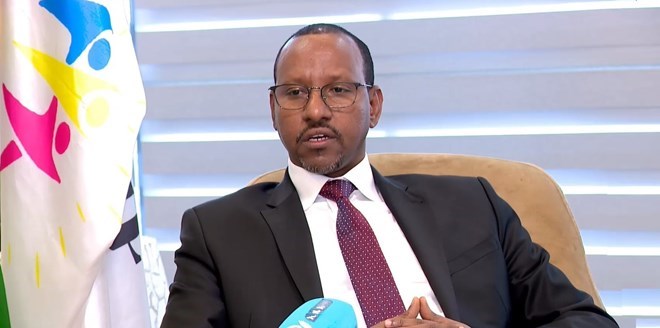
Addis Ababa (HOL) – Ethiopian Prime Minister Abiy Ahmed appointed Adem Farah as the head of the Democracy System Building Coordination Center with the rank of Deputy Prime Minister on Monday.
According to the Office of the Prime Minister, the appointment is effective from April 1, 2024. The Democratic System Building Center at the Office of the Prime Minister is a new office in the structure of the Ethiopian government.
Adem Farah currently held the positions of Deputy and Head of the Prosperity Party’s Center, the ruling party in Ethiopia. It has not been clarified whether he will retain both positions.
Aden Farah, a politician from the Somali regional government in Ethiopia, particularly from the Siti region, has held various positions in the past. He served as the Speaker of the Federation Council of Ethiopia and Vice President of the Somali Region and previously held the position of Mayor of Diridhabe.
The Somali regional government and the Somali people have welcomed Adem’s new position, considering this appointment a victory for the people of the Somali Regional Government.
Somalia’s bicameral Parliament approves amendment of provisional Constitution
Source: Hiiraan Online, SATURDAY – MARCH 30, 2024
Somalia’s bicameral Parliament approves amendment of provisional Constitution
Baarlamaanka labadiisa aqal oo maanta loo qeybiyay nuqulka wax ka beddelka dastuurka
KHAMIIS, MAARSO 28, 2024, Source: Hiiraan Online
Baarlamaanka labadiisa aqal oo maanta loo qeybiyay nuqulka wax ka beddelka dastuurka
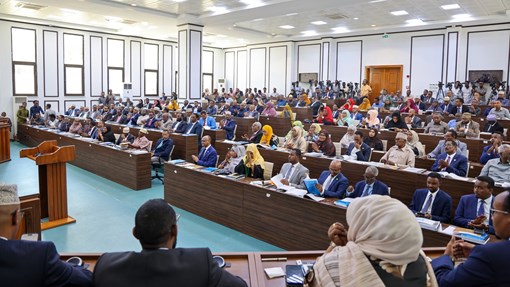
Khamiis, Maarso, 28, 2024 (HOL) – Baarlamaanka dowlaldda Federaalka Soomaaliya labadiisa gole ayaa maanta loo qaybiyay nuqulka u dambeeya ee soo jeedinta wax ka beddelka afarta cutub ee ugu horreeya Dastuurka kumeel gaarka ah.
Djibouti to host next round of Somalia-Ethiopia diplomats talks
Djibouti to host next round of Somalia-Ethiopia diplomats talks

Source: Hiiraan online, Thursday March 28, 2024
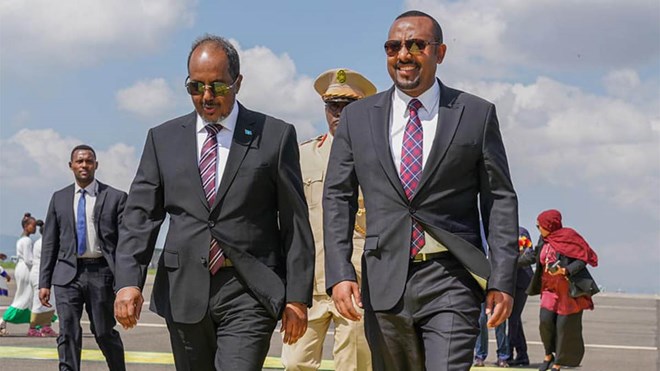
Mogadishu (HOL) – Djibouti’s Foreign Minister, Mahmoud Ali Youssouf, stated that Djibouti, along with Kenya, is working to restore the good relations between Ethiopia and Somalia to their previous level.
Speaking to MMTV on Wednesday, the Foreign Minister emphasized that a previous meeting between Ethiopia and Somalia was held in Kenya, and another meeting is expected to be held in Djibouti. Still, he did not mention any specific time.
Neither Somalia nor Ethiopia mentioned any previous meetings about the MoU in Kenya.
Minister Mahmoud reiterated Djibouti’s position of respecting Somalia’s independence, stating that the Djibouti government does not believe Somalia should be divided.
“The region has had many troubles; we do not want another new war in the region,” he added.
The new political dispute between the Somali government and the breakaway region of Somaliland started after Somaliland President Muse Bihi and Ethiopian Prime Minister Abiy Ahmed signed a Memorandum of Understanding (MoU) in Addis Ababa on January 1, granting Ethiopia access to the Red Sea in exchange for a stake in Ethiopian Airlines.
The Somali government strongly rejected the MoU, warning Ethiopia against any actions violating Somali sovereignty.
